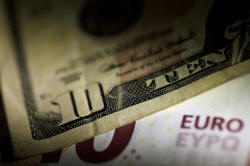Euro rebounds from earlier lows as traders brush off
Germany worries
 Send a link to a friend
Send a link to a friend
 [November 20, 2017]
By Jemima Kelly [November 20, 2017]
By Jemima Kelly
LONDON (Reuters) - The euro recovered from
a two-month low against the yen touched in Asian trade on Monday, with
investors brushing off broader political risks arising from German
Chancellor Angela Merkel's failure to form a three-way coalition
government.
Merkel, whose conservatives were weakened after they won an election in
September with a reduced number of seats, said she would inform the
German president that she could not form a coalition, after the
pro-business Free Democrats withdrew from negotiations.
The development thrust Germany into a political crisis that raised
worries among investors of a new election if Merkel cannot form a
minority government.

But after selling off sharply in early deals in Asia, trading down as
much as 0.8 percent to hit 131.16 yen <EURJPY=EBS>, the euro's weakest
since Sept. 15, the single currency rebounded as much as 1 percent to
trade flat on the day, at 132.18 yen.
"What usually happens after any news at the weekend is that Asian
trading tends to be a bit less liquid, and that can exaggerate the scale
of the moves; when Europe came in, markets took a more level-headed
approach," said MUFG currency strategist Lee Hardman, in London.
"Thereís a bit of uncertainty Ė we donít know what the next step is
going to be, whether itís going to be a minority government or fresh
elections - but in terms of the bigger picture I donít see any
significant change in how you value the euro," he added.
If there were another election in Germany, the far-right, anti-immigrant
Alternative for Germany (AfD) party could add to the 13 percent of votes
it secured in September. But the parliamentary process required to get
through another election is considered to be quite difficult, involving
more than one vote in the German parliament.
[to top of second column] |

U.S. Dollar and Euro notes are seen in this June 22, 2017
illustration photo. REUTERS/Thomas White/Illustration/File Photo

The dollar had also sold off against the yen - generally sought at times of
uncertainty - in Asian trading, dipping to a one-month low <JPY=>. But it turned
higher against the Japanese currency in European trading, up 0.1 percent at
112.14 yen.
The euro fell as much as 0.5 percent against the dollar in Asian trading to
$1.1722 <EUR=>, pulling away from a one-month high of $1.1862 set on Wednesday
last week. But it recovered to trade flat on the day at $1.1789 in London trade.
"Thereís no panic in the market at all Ė itís really a European story," she
added. "Weíre not seeing a broad risk-off move here," said Commerzbank currency
strategist Esther Reichelt, in Frankfurt.
Bitcoin was trading at just above $8,000, after hitting a record high of $8,087
on the Luxembourg-based Bitstamp exchange on Sunday <BTC=BTSP>.
Many analysts expect this to be a relatively calm week of trading, with U.S.
markets closed for the Thanksgiving holiday on Thursday and with few major data
releases.

(Reporting by Jemima Kelly; Additional reporting by Masayuki Kitano in
Singapore; Editing by Richard Balmforth)
[© 2017 Thomson Reuters. All rights
reserved.] Copyright 2017 Reuters. All rights reserved. This material may not be published,
broadcast, rewritten or redistributed. |